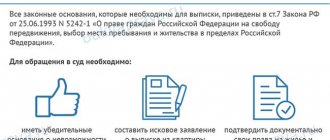Article updated: March 25, 2021
Alexey BessonovPracticing Moscow lawyer
Hello. If a brother or sister does not want to be discharged, ignores this requirement, or contact with them is lost, they can only be discharged through the court - clause 1 of Art. 35 LC RF and Art. 7 of the Law of June 25, 1993 N 5242-1. The owner of the apartment should file a claim, participate in court hearings, receive a positive decision and submit it to the passport office. The article is relevant for both relatives.
If there are several owners, they must all agree to the person’s discharge, indicating this in the claim and reporting it in court - clause 1 of Art. 247 and paragraph 1 of Art. 253 Civil Code of the Russian Federation. If one of them does not agree, the court will make a negative decision.
If the registered brother or sister refused to privatize the apartment and now they need to be expelled from there, this changes things. The same thing happens when a brother/sister spent the right to privatization and did not participate in it, but wrote consent to it. Go to separate instructions on how to discharge a person who has refused privatization.
Reasons for discharging a brother or sister
IMPORTANT: There is no need to confuse kinship with your brother/sister in the usual sense and according to housing legislation. These are different things and see this below.
- Art.
304 of the Civil Code of the Russian Federation - “The owner may demand the elimination of any violations of his rights, even if these violations were not associated with deprivation of ownership.” The registration of a brother/sister prevents the owner from freely using and disposing of his apartment, therefore he has the right to demand that this circumstance be eliminated, i.e. write them out.↓ - Then it all depends on the status in which the current owner registered his brother/sister or whether the previous owner registered them. It's all about clause 1 of Art. 31 of the Housing Code of the Russian Federation - “Members of the family of the owner of a residential premises include his spouse living together with this owner in the residential premises belonging to him, as well as the children and parents of this owner. Other relatives, disabled dependents and, in exceptional cases, other citizens may be recognized as members of the owner’s family if they are settled by the owner as members of his family.” Therefore, I will describe individual cases below.
Situation No. 1 - Registered as a relative
If the current owner has registered his brother, and he is recorded as such in the house register, then he is registered as a family member. The same goes for my sister. This means that the owner needs to recognize the brother/sister as a former family member, who then automatically lose the right of residence - clause 4 of Art. 31 Housing Code of the Russian Federation.
To recognize a person as a former family member, certain conditions must be met. They are described in paragraph 13 of the Resolution of the Plenum of the Supreme Court dated 08/02/2009 N 14. The conditions are accepted by the court IN THE WHOLE and makes a decision on the specific circumstances of each case:
- The brother/sister does not maintain a common household with the owners.↓
- There is a separate budget between them.↓
- They do not provide assistance and mutual support to each other; there are conflicts and disagreements in the family.↓
- The brother/sister does not live in the apartment and does not pay utility bills - these conditions are additional advantages when they are discharged, but are not mandatory.
The main conditions are numbered 1, 2 and 3. Therefore, the apartment owners need to write in the statement of claim that: 1. There is no common household with the brother/sister, there is no common budget, there is no help and respect, there are constant conflicts. Family relations with him/her have been terminated; we recognize him/her as a former family member. 2. He/she does not live in the apartment and does not pay utility bills (only if this is really the case). 3. We ask the court, on the basis of termination of family relations, to recognize the brother/sister as having lost the right to use. It is not necessary to prove the termination of family relationships and the fact of non-residence . It is enough to indicate this in the claim and report it in court.
Even if a brother/sister lives in an apartment and pays utilities, the owner still has a high chance of being discharged. The main thing is to “put pressure” on the termination of family relationships, because filing a lawsuit partially proves this. A judge IN RARE CASES can leave them a residence permit, but only for a certain period (from 3 months to a year).
To be completely sure, you can provide documents confirming that your brother/sister has other real estate. I have indicated how to do this below.
Situation No. 2 - Not recorded at all
If the current owner has registered a brother/sister with him, but the relationship is not indicated in the house register, then we register him as a stranger, and not as a family member. It’s the same thing when a home book doesn’t have a section on kinship.
In this situation, it is considered that the owner has entered into an oral agreement with his brother/sister for the free and unlimited use of the apartment - clause 2 of Art. 30 LC RF and clause 1 art. 689 of the Civil Code of the Russian Federation. That is, he let me live with him for an indefinite period.
The owner has the right to unilaterally terminate oral agreements with a stranger regarding his residence - clause 1 of Art. 699 Civil Code of the Russian Federation. Therefore, the owner must indicate in the statement of claim that: 1) He did not register the brother/sister as a member of his family. 2) We ask the court to recognize them as having lost the right to use on the basis of clause 1 of Art. 699 Civil Code of the Russian Federation.
Situation No. 3 - A brother or sister was registered by the previous owner
Then it doesn’t matter how they are entered in the house register. The current owner can easily write them out on the basis of clause 2 of Art. 292 of the Civil Code of the Russian Federation - “The transfer of ownership of a residential building or apartment to another person is the basis for termination of the right to use residential premises by family members of the previous owner.” In simple words, those who were registered by the previous owner lose the right of residence after the transaction. Kinship and the fact of residence do not play a role here. In the statement of claim, it is enough to indicate that the brother/sister lost the right to use on the basis of clause 2 of Art. 292 of the Civil Code of the Russian Federation.
Extract of certain categories of persons
- Child
Forced discharge when there is no parental consent. In any case, withdrawal is not possible:
- if the child remains homeless, even if his parents have been discharged;
- minor home owner (share in property);
- children participated in the privatization of municipal housing.
Guardianship permission is required if, upon forced discharge, the new housing will be worse than the previous one.
A classic situation in which it would be easy to discharge a child without consent. If he is discharged to his parents (parent) from a stranger from a municipal apartment. But even in this case, you will need permission from guardianship and a court decision.
In general, the outcome of a court case depends on many circumstances. But the court initially stands for the protection of the rights of the child.
- Parent deprived of parental rights
If a parent living with a child has been deprived of his rights, he is subject to expulsion from the apartment without his consent. It doesn't matter whether he has other housing or not.
- Convicted
He can be discharged based on his conviction. To do this, it is enough to contact the passport service directly without going to court for eviction. However, after serving the sentence, the prisoner can demand restoration of his rights. And if, for example, the apartment is exchanged after the convict is discharged, then there may be forced occupancy.
- Drafted into the army
The discharge is made on the basis of a message from the military registration and enlistment office. A serviceman is registered at the place of service. Transactions with housing are permitted without restrictions. After returning from the army, the conscript will not have any authority to cancel transactions.
- Missing or declared dead
Such citizens can be discharged on the basis of a court decision to recognize them as missing or dead. Afterwards, you can perform any actions you like with the apartment. If the discharged person shows up, then a reversal of transactions will not be allowed. The exception is if other residents knew about the location of the evicted person and acted maliciously.
About your residential address
I’ll analyze this situation: “If I don’t know where my brother/sister lives now, what is their residential address to indicate in the claim? Or do we always indicate the actual address?”
According to paragraph 63 of the Supreme Court Resolution No. 25 of June 23, 2015, the defendant’s place of residence is recognized as his place of registration. This means that in the claim we indicate the address of the brother/sister’s residence as the address of the apartment from which we will be deporting them. The owner is not required to know where the defendant actually lives.
The court will send summons to the brother/sister at the registration address - Art. 113 Code of Civil Procedure of the Russian Federation. The law is followed here because receiving correspondence is a citizen's responsibility. It does not matter whether the defendant receives the summons. The decision will be made without his participation - clause 4 of Art. 167 Code of Civil Procedure of the Russian Federation.
Our law office "Bessonov and Partners" offers residents of Moscow or the region. We will take on all the work - we will draw up a correct statement of claim, collect all the necessary documents and submit them to the court. You do not need to be at the meetings; the office's lawyer will participate in them and will do everything possible to win the case. Then we will bring you a copy of the court decision.
We have been working in the field of court records since 2008 and have won 84% of court cases.
The cost of the service is 60 thousand rubles. There is a discount from 5% to 10% for site visitors. To receive it, say that you came from the website “Prozhim.com”. For a free consultation, call number 8 (daily from 9:00 to 21:00 Moscow time / only for residents of Moscow and the region).
Instructions. Stage one - we demand in writing that the brother/sister move out
This needs to be done only in situation No. 2 - when the current owner has registered the brother/sister as an outsider. Even if they don't live in the apartment. In other situations, there is no point in notifying; it is a waste of time to move on to the next step.
This pre-trial procedure is described in paragraph 1 of Art. 699 of the Civil Code of the Russian Federation - “Each of the parties has the right at any time to refuse a contract for gratuitous use concluded without specifying a period, notifying the other party one month in advance, unless the contract provides for a different notice period.” The owner should file a claim in court only one month after sending the written notice, otherwise it will not be accepted. After all, it must be proven that the pre-trial procedure has been fulfilled - Art. 71 Code of Civil Procedure of the Russian Federation. During this month we are collecting documents for the court (the next stage).
We draw up a notification according to the sample and go to the post office. We send the notification by a valuable letter with a description of the attachment to the brother/sister’s registration address. With the mail operator, you should fill out two copies of the inventory, in which we indicate the name of the document that will be sent. For example, notice of termination of contractual relations - 1 pc. Both copies of the inventory will be certified by the operator, then one will be put in an envelope with a notification, and the second will be given to the sender. The service costs about 250 rubles. We make sure to keep the inventory with the shipping receipt, because they need to be filed in court as evidence.
Samples of documents from mail
(click on the pictures to enlarge them)
Inventory
Check
The director of the legal service “Unified Center for Protection” (edin.center) Konstantin Bobrov answers:
The Housing Code of the Russian Federation contains such a concept as “member of the owner’s family.” This means a person, including a parent, who lives with the owner of the property and maintains a common household with him. In accordance with the law, if the relationship with a family member of the owner is terminated, the latter can evict the former family member in court by filing an appropriate lawsuit. In the described situation, the mother of the child owners is a member of their family and helps them run the household. And without the initiative of the owner himself, a member of his family cannot be evicted. Therefore, if the ex-husband applies to the court for eviction, then one must refer to the fact that the mother of the children is not a member of the ex-husband’s family, but a member of the family of her children-owners. Accordingly, only the children themselves can evict their mother, and not the ex-husband. The law in this case is on the side of the mother. You also need to pay attention to the fact that eviction is allowed only by judicial procedure. Therefore, if the ex-husband makes attempts to evict the mother of the children in pre-trial order, he can file a complaint with law enforcement agencies about the illegality of his actions and to bring him to justice.
How to discharge a person from an apartment if he has no other housing?
Can a mother register the share of her minor son?
Stage three - we send the documents to the parties
Plaintiffs are obliged to do this before going to court - clause 6 of Art. 132 Code of Civil Procedure of the Russian Federation.
We make copies of the above documents (except passports) and contact any post office (find the nearest one). We send one set of documents to the brother/sister at the registration address, and the second to the Migration Department of the district Ministry of Internal Affairs (formerly the Federal Migration Service). The address can be found on the Internet.
We send each set by a valuable letter with a list of the contents. The postal operator will provide two inventory forms. In both we write the name of each document being sent. For example, statement of claim - 1 piece, certificate of ownership - 1 piece. Both forms will be certified by the operator, then we put one inventory in an envelope with documents, and the second is given to the sender.
Each shipment costs about 250 rubles. We make sure to keep inventories and payment receipts. They will prove to the court that the requirements of the law have been fulfilled.
Samples of documents from the post office
(click on the pictures to enlarge them)
Inventory
Check
Stage four - trial
You can file a claim in court immediately after sending the documents (previous stage). The trial lasts 2.5 - 5 months, although the law states a maximum of 2 months - clause 1 of Art. 154 Code of Civil Procedure of the Russian Federation.
One of the owners can file a claim and participate in court; all of them do not have to. Whoever appears in the statement of claim as a plaintiff is the one who files. Or this is done by a representative by proxy. If one of the plaintiffs is under 14 years old, one of the parents/guardians must take his place - Art. 28 Civil Code of the Russian Federation. If he is between 14 and 18 years old, he must also be present with one of his parents/guardians - Art. 26 Civil Code of the Russian Federation.
- You need to contact the district/city court at the location of the apartment - Art. 24 and art. 28 Code of Civil Procedure of the Russian Federation. If a city is divided into districts, then into a district one. If not divided, go to the city.
First, in the court office you need to clarify the details for paying the state fee. They usually hang on an information board or date a receipt. State duty will be 300 rubles - pp. 3 p. 1 art. 333.19 Tax Code of the Russian Federation. You can pay at any bank or through a banking application.Next, we submit to the court reception (expedition): 1) Collected documents - the second stage; 2) Copies of receipts and inventories from sending documents to the defendant and a third party - the third stage (copies); 3) Copies of the eviction notice, inventory and receipts upon its dispatch - the first stage; 3) Receipt for payment of state duty.
The court employee will put a stamp on each copy of the statement of claim with the entry number and date of acceptance. One of the copies will be given to the plaintiff.
Sample of a stamp confirming the acceptance of a statement of claim
- The judge will consider the claim.
Within 8 to 10 working days, the judge will review the claim and decide to accept it, reject it, or leave it without progress. Although the law specifies 5 working days - clause 1 of Art. 133 Code of Civil Procedure of the Russian Federation.Upon acceptance of the statement of claim, a date and time for a preliminary hearing will be set. It usually goes away within 15 - 35 days. The court will send subpoenas to plaintiffs, defendants and third parties - clause 2 of Art. 113 Code of Civil Procedure of the Russian Federation. They are also notified via SMS.
I advise you not to wait to receive a summons, but rather check with the judge in a week about the date of the preliminary hearing. Each judge has office hours for citizens - usually Monday and Thursday. The name of the appointed judge must be asked in the office (expedition) of the court.
- Preliminary meeting .
The preliminary hearing is preparation for the trial - Art. 152 Code of Civil Procedure of the Russian Federation. In it, the judge listens to the parties' demands and reviews the submitted documents. A court date will then be set. Usually it goes away 10 - 30 days after the preliminary one. Subpoenas will be sent to the defendant and third parties again - Art. 113 Code of Civil Procedure of the Russian Federation. - Court hearing.
First, the judge will announce the requirements for the lawsuit. Then he will listen to each side, their additions, and ask questions for clarification. The plaintiffs need to be informed that the defendant’s registration violates their right to own the apartment. I have analyzed which laws need to be referred to by situation.If the defendant does not show up for the first hearing, the judge may schedule another one, but this is rare. The court has the right to consider the case without the participation of the defendant and make a decision if he does not provide a valid reason for failure to appear - Art. 167 and art. 233 Code of Civil Procedure of the Russian Federation. The second meeting will take place 10-30 days after the first.
- The judge announces his decision .
After considering the demands and arguments of the parties, the judge will announce his decision - Art. 193 Code of Civil Procedure of the Russian Federation. If the defendant comes to court, the decision will be in person. If he doesn’t come, then in person or in absentia (at the discretion of the judge) - Art. 233 Code of Civil Procedure of the Russian Federation. - We receive a copy of the court decision . Usually it is issued 8 - 10 days after the announcement. To clarify readiness, you should call the court office. A copy of the decision will be sent to the defendant by registered mail.
How can an owner expel a relative from an apartment without consent?
The procedure and procedure for expelling a relative from an apartment without his consent are quite standard, if one can say so about legal proceedings and forced eviction. Let's take a closer look.
Procedure
Instructions for removing a relative from registration without his consent:
- Prepare a claim and send it to a relative.
- Collect documents for the court.
- Go to court.
- Get a solution.
- Based on the decision to evict a relative from the apartment.
Procedure
Let's take a closer look at the entire procedure.
Claim
The first step is to file a claim with relatives. It is mandatory, as it allows you to prove the fact that the owner tried to solve the problem pre-trial. It is best to send your claim by registered mail and record your every step on video. Alternatively, you can submit your claim in the presence of witnesses. Only they must be disinterested persons.
The claim specifies a requirement to vacate the apartment and deregister within a certain period of time (usually about 1 month) due to specific reasons. If there is no response, you will have to wait the whole month (or another period specified in the claim) and only then go to court.
Going to court
When going to court, you will need to not only prepare all the documents, but also draw up a statement of claim. It is drawn up according to standard rules. See sample and content below. After filing the application, the court will consider the claim. You will have to be patient, this is not a quick procedure.
After consideration, a meeting date will be set. It is recommended to attend. And only after this will one decision or another be made. But it does not come into force immediately, but only after 1 month. This period is given to the defendant or plaintiff to challenge the decision if it does not suit them.
Forced eviction of relatives
As soon as the decision has come into force, you can go to the MFC and demand that your relatives be deregistered. This is also a relatively lengthy procedure, but in the end the owner can finally get rid of the tenants. It should be borne in mind that in some cases, residents refuse to voluntarily leave premises in which they no longer have the right to be. If this is the case, then you will have to contact the bailiffs and ask them to help in exercising the rights of the apartment owner.
Statement of claim
The statement of claim is drawn up taking into account all the requirements described in Article 131 of the Code of Civil Procedure of the Russian Federation. This document must contain the following information:
- Where is the application sent?
- Who submits the application?
- Who will be the defendant in this lawsuit?
- General description of the situation.
- Evidence that the plaintiff is right.
- Requirements for the defendant.
- List of attached papers.
- Date and signature.
Sample
Documentation
The list of documents that is attached to the claim is also described in the legislation (Article 132 of the Code of Civil Procedure of the Russian Federation). To summarize, the list would look like this:
- Passports of the applicants/applicant.
- Receipt for payment of state duty.
- Proof.
Price
Going to court requires paying a state fee. Since the relatives are not the owners, they have no rights to the property. This means that the claim relates to non-property claims. As a result, the state duty will be exactly 300 rubles (clause 3, clause 1, article 333.19 of the Tax Code of the Russian Federation). The check-out and subsequent eviction procedures do not involve additional payments. They are produced free of charge.
If you plan to work through a representative, you will also need to issue a notarized power of attorney. The cost of such a document is about 2-5 thousand rubles.
Deadlines
Approximate time frame for discharging relatives without their consent:
- Direction of claim: 1 month or more.
- Appeal to court: up to 2 months + 1 month to wait for the decision to come into force.
- Discharge without consent: about 1 month.
Stage five - we wait for the court decision to come into force and register the brother/sister at the passport office
The losing party is given a period to challenge the decision by filing an appeal to a higher court - Art. 320 Code of Civil Procedure of the Russian Federation. Therefore, you need to wait until the decision comes into force - Art. 210 Code of Civil Procedure of the Russian Federation.
If the decision is in person and the defendant does not appeal, it will come into force in a month - clause 1 of Art. 209 and art. 321 Code of Civil Procedure of the Russian Federation. The month must be counted from the date of the final court decision. It is indicated in the text of the decision. For example, “The reasoned decision was made on May 6, 2021.” This means it comes into force on June 6th.
The default judgment comes into force 7 days after the defendant receives it, but does not appeal - clause 1 of Art. 244 and paragraph 1 of Art. 237 Code of Civil Procedure of the Russian Federation. The court will send the defendant a judgment in absentia to the address from which he was discharged. If he does not receive a decision, you need to count 1 month and 10 days from the date the decision is finalized. This is indicated in paragraph 14 of the Review of Judicial Practice of the Supreme Court No. 2 (2015) dated June 26, 2015. I advise you to wait at least 1.5 months.
When the decision comes into force, the plaintiffs need to submit a copy and the original to the passport office. The original will be returned immediately. After the defendant is discharged, I advise you to obtain a certificate of registered persons.
The court itself will send a copy of the decision to the migration department of the district Ministry of Internal Affairs.
Execution of a court decision
If the issue of eviction is not raised, and the problem lies solely in the discharge of a former family member, then a writ of execution is not required. It will be enough to present to the registration authority a copy of the court decision, which will contain the wording on the discharge of the former family member. If the dispute involves forced eviction, then after the court decision enters into legal force, you will need to obtain a writ of execution from the court office and submit it to the bailiff.
Bailiffs are obliged to evict a former family member after the expiration of the period for his voluntary execution of a court decision. Eviction includes vacating the apartment from the debtor, his property, pets and prohibiting the debtor from using the vacated premises.
Related situations
How to remove a tenant from an apartment without his consent? Find out →
Stage six - we evict the brother/sister if he lives in the apartment
After the court decision comes into force, the defendant is obliged to move out. If he ignores the demand, the plaintiffs have the right to prevent him from entering the apartment by changing the locks. For example, when he leaves for work. It does not matter if the defendant then calls the police. The arriving police officer must be shown the court decision and a recent certificate of registered persons. These documents prove that the defendant has lost his right of residence and has been discharged. Now he does not have the right to enter the apartment without the consent of the owners - clause 2 of Art. 30 Housing Code of the Russian Federation. If he still has things, let him write a written demand to return them.
Therefore, you should not indicate an eviction request in your claim. And without this, the defendant is obliged to move out. The prosecutor will also participate in court with this requirement - clause 1 of Art. 45 Code of Civil Procedure of the Russian Federation.
The instructions are partially described from my other article - source.
If you have questions, you can consult a lawyer below on the right for free or by phone: 8 (495) 642-31-96 - Moscow and region; 8 (812) 425-62-89 — St. Petersburg and region; all regions of the Russian Federation.









